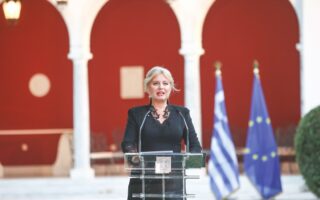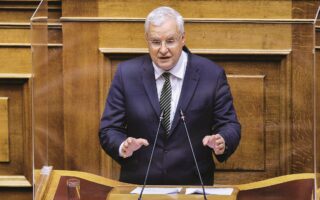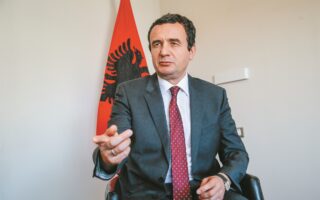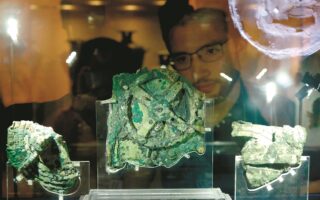How Russia spreads its influence in Europe
Veteran MI6 agent Christopher Steele speaks to Kathimerini about Moscow’s network of agents of influence, bots and media
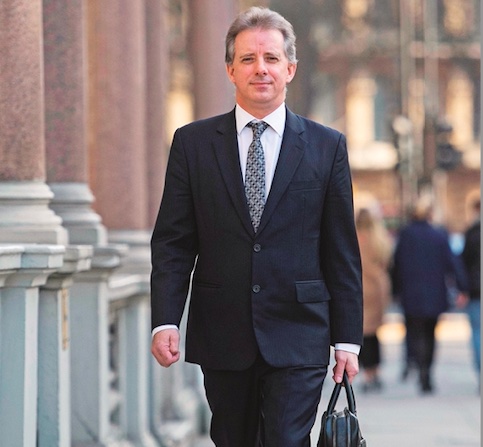
In Russian intelligence slang, it is called “kompromat.” A kompromat is any sensitive personal data that can be used as a means of influence and blackmail. The Russian term entered the American public sphere in 2017, a few months before Donald Trump was sworn in as president, thanks to a veteran MI6 agent, Christopher Steele. Steele had compiled a dossier of evidence – the now infamous “Steele dossier” – which showed that Russian agencies had amassed a lot of kompromat against the US president – guilty secrets through which the Russians could “control” Trump.
A member of Britain’s Secret Intelligence Service (SIS/MI6) from 1987 to 2009, as well as director of the Russia desk (2006-09) at MI6 headquarters in London, Steele has repeatedly defended the information contained in the “dossier” as credible.
Against this heavy background, Steele spoke to Kathimerini about today’s Russia, the methods of undue influence it uses in third countries, including Greece, and the development of the invasion of Ukraine.
Did you ever uncover pieces of evidence of Russian intelligence operations or interference in the UK?
In terms of what Russia’s been doing in Britain for the last 15 or 20 years. I mean, there is a massive influence operation going on. It is quite complicated to break down because, on the one hand, you have people who are effectively pursuing their own commercial interests primarily to get investments and taken onshore here and through the regulators and some of that is legitimate and some of it is not. And of course one of the big issues there is what the origins of the wealth are and who is the ultimate beneficial owner of the asset.
How does Russian propaganda infiltrate European societies?
They do it through a whole multiple different set of ways. One is obviously money plays a very big part in it, whether it is buying up lobbyists or journalists or whatever to argue their case, which of course is now particularly difficult after the invasion of Ukraine. But also they do it through agents of influence, facilitators and others. And we see that, particularly in terms of the people who are technically non-state actors, say oligarchs and others who do not hold official state positions in Russia, but clearly are working, whether willingly or unwillingly, to meet the objectives of the Kremlin and of Putin.
What are the methods of Russia’s intelligence of influencing foreign public opinion?
Moscow tends to latch on to parties of both the extreme right and the extreme left in Europe, which are slightly marginal in the system, and operate as disruptors
You have got everything from bots operating systematically in social media space to particular agents of influence that are probably being paid by them to push the Kremlin line on a range of issues in the public square here. Ownership of assets, media assets, in this country and elsewhere. And they have their own media outlets. But I do not think they are particularly effective, to be fair.
The other thing is that they have kind of allied themselves, the Russians and their agents, with what you might call extremist political parties in the West and disruptive political parties in the West. And they have kind of forged a conception of common interest.
Are they taking advantage of the common religious routes like Christianity to divide the European societies?
The way to understand this is inside the Russian Federation itself, which is of course the biggest land empire that has ever been built. Make no mistake, the Russian Federation was built upon violence and oppression, and it is not any kind of voluntary union of different peoples. But inside that federation itself, I think there is a concern by Putin and others around him that the part of the Russian population that is growing is the Muslim parties, the ethnic minorities.
They seem fearful that the core Russian population, Orthodox, white, and so on, is not going to be in a majority going forward. And therefore they have to kind of suppress it and they have to make a common cause with other people who are suppressing such change and the United States is an obvious place for that.
So, I think one of the reasons actually they are trying to annex parts of Ukraine – it might sound slightly bizarre, but I think it is true – is to increase the numbers of core Orthodox Russians and Slavs inside the Russian Federation to counterbalance the growing ethnic minorities as part of the population there.
I think that is one way they do it and they do appeal through things like there is “a dialogue of civilizations.” I think you would know about it because it has its or used to have its annual meeting in Greece, I think led by a former KGB officer called Yakunin.
Putin is trying to create alliances abroad using Russian Orthodox Christianity in Russian Orthodox culture as a means of gluing together different Orthodox groups. And Greece, obviously, is an obvious place to go. But, even some of the Catholic populations around Europe as well are seen to be quite susceptible to that kind of appeal.
Is there any evidence of Russian involvement in the southern countries of the European Union, such as Greece or Cyprus?
It has already got to the point where if you do an investigation of a Russian corporate structure, particularly a questionable Russian corporate structure, it will have a tentacle in Cyprus. It will have an element in Cyprus because that is a soft underbelly of the European Union – Cyprus, Malta, and a few other places where they are able to get around the Russians that is proper regulation by presumably bribing people and by blackmailing and pressurizing people to go along with their wishes. It pains me to say it because I grew up there and I love Cyprus.
A few years ago, Greece had its first elected leftist government. One of the key proposals was to strengthen relations with Russia and seek financial assistance from Russia to repay our debt. Based on that experience what is your assessment of the power of Russian political influence on the leftist parties?
I think what Russia has done obviously is look to weaknesses in the European Union, weaknesses in our own country, and it amplified them and it has tended to latch on to, if you like, parties of both the extreme right and the extreme left in Europe, which are sort of marginal, slightly marginal in the system, and operate as disruptors that are not for the status quo. They want to disrupt and change things and, in Greece, you had this left party come to power some years ago, obviously, and that will have been seen.
Are they trying to forge Trojan horses in the EU?
Yes, absolutely. The one case that people do know about is loaning money to the French Front National. Going back a few years, there was a big Russian loan to the Front National involving millions of euros. And we have some evidence in this country that the Russians were pouring money into, in particular, the sort of the Brexit following parties and supporting parties.
The United Kingdom was one of the main players in the European Union. Was it not aware of this infiltration?
Even going back to the 1980s, frankly, when the gas pipelines were first devised and built out of Siberia, there was controversy at the time about creating dependency even then. That is 40-45 years ago.
I think that it was very clear from about 2005 that Putin and his supporters had conceived of hydrocarbons as a strategic political tool and lever. And when the first gas cutoffs came in 2006-07, we were shouting from the rooftops about it and saying: “Beware, this is their tactic strategically going forward. They are going to create a dependency on them and then they are going to be able to effectively blackmail us politically that if we oppose what they are doing elsewhere, they will cut off gas or threaten to.”
But Germany was completely deaf and blind to this. Germany’s model has been in the last few decades to take cheap Russian gas, use it in its industry to build high-quality engineering goods, and export them to China primarily. Most German companies make their biggest profits in China.
And of course that dismayed Germany. And because Germany is the biggest, most powerful country in Europe, the whole of Europe is certainly vulnerable to these despotic, authoritarian regimes. And, you know, as we say in English, “the chickens are coming home to roost.”
Based on your knowledge, was it the right time for Putin to start the war, the invasion?
I think most of us felt that he would. And it is part of his wish to have this legacy that he is so focused on now. He has become incredibly kind of self-centered and self-regarding and narcissistic. He is possibly ill, quite likely ill. And therefore, that is accelerating his wish to realize some of these objectives.
I think we realistically looked at the logistics of it and the history of it, thought that he would possibly send troops into Donetsk and Luhansk only and try and take those provinces and annex them to Russia and maybe create a land bridge around the coast to Crimea, but there would be no bigger invasion than that.
So I think he played his hand fairly cleverly up until that point. But at that point, I think, logistically, Russia was not capable of realizing its objectives. And B, he underestimated the Western reaction because he was basing it on what had happened previously in 2014 in particular.
And I think he was badly informed, misinformed about the mood in the politics in Ukraine that he fully expected. And the FSB had been bribing, paying people, and so on, so that there was almost a sort of shadow government system, oppositional government structure in Ukraine, which once the Russian troops had defeated the Ukrainian army, would naturally slot into place and produce a puppet regime. Now, clearly, he was badly informed about that. That operation is a disaster because there are no significant Ukrainian politicians that are remotely interested in doing Russia’s bidding in Ukraine.
Do you think the war will escalate in other parts of Europe?
I think on that point, it depends on how the military campaign unfolds in Ukraine, because it certainly looks to me as though whatever Putin’s intent is, I am sure he would like his legacy to be the re-establishment of the territorial extent of at least the Soviet Union. At the end of it, Russia just does not have the capability to do this. I mean, they may try something crazy like a bomb somewhere or fire rockets somewhere, but they just do not have the military capability to effectively occupy or control for any length of time any large territory outside of where they are at the moment.
Throughout your years at MI6, what was the main lesson on the world of intelligence?
I think in terms of intelligence, obviously, intelligence is not a science. Particularly human intelligence is more of an art form. It is about understanding the context in which things are said and written. And, in a regime like Russia, people at the top of the regime lie to each other and that can be faithfully reported back to you as what has been said. But of course it does not mean it is true. So it is a very complicated thing.

